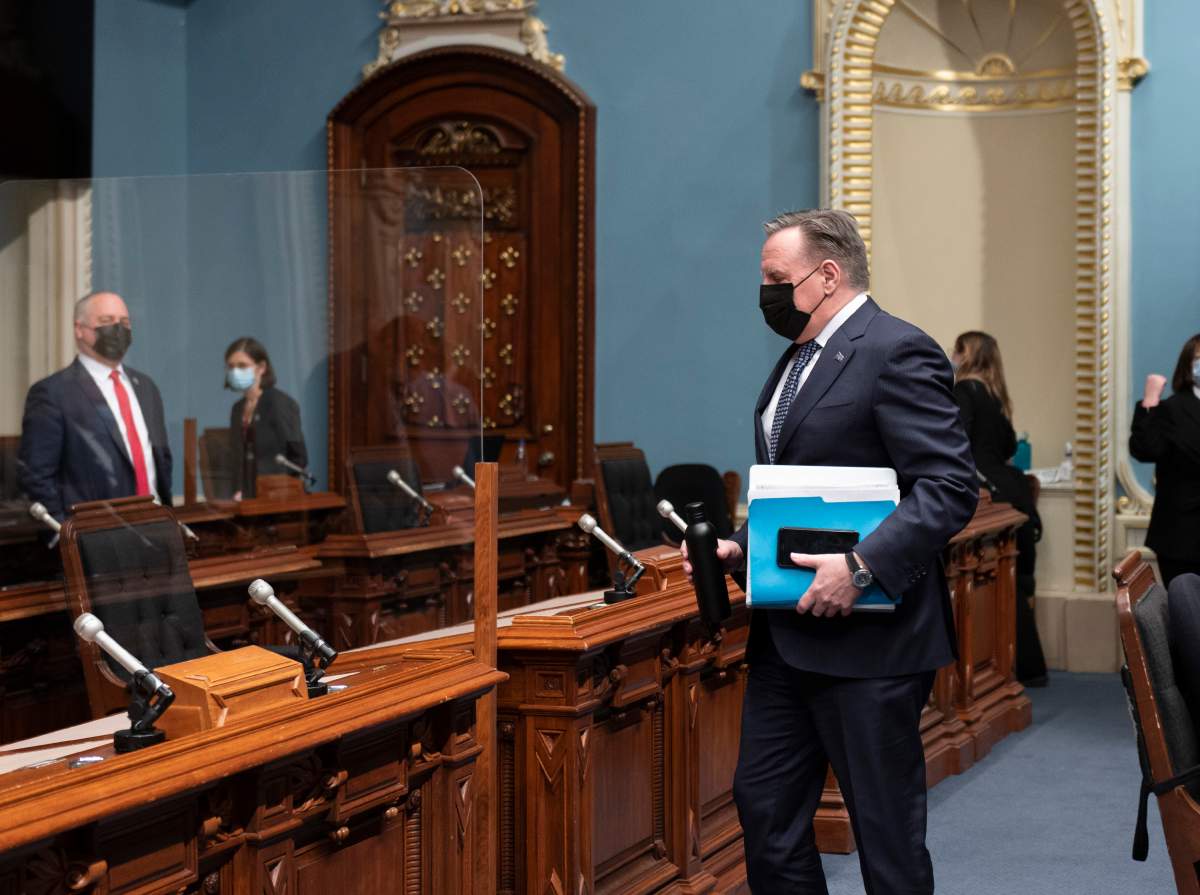Quebec’s opposition parties are accusing the government of taking too long to give up COVID-19 emergency powers and they say the delay is helping Premier François Legault and his ministers avoid scrutiny.

Earlier this week, the government renewed the state of emergency for the 99th time since March 2020. Legault told reporters the emergency order would only be lifted once a bill is passed allowing the government to keep some powers, such as the ability to impose the vaccine passport system and mask mandates.
Opposition parties, however, say the government should end the state of emergency and have a debate in the legislature about what measures should remain.
Quebec’s government has used its emergency powers to impose curfews, ban private gatherings and shutter businesses. The emergency orders have also permitted health authorities to impose mandatory overtime on nurses and to cancel health workers’ vacations.
Liberal health critic Monsef Derraji said the government uses ministerial decrees too often. So often, he said, that the government hasn’t asked the legislature to approve 30-day extensions to the state of emergency, but rather, it has used the health minister’s power to extend it 10 days at a time.
“It’s the wrong way to govern,” Derraji said in an interview Thursday.
Health Minister Christian Dubé has said he would introduce a bill in March to lift the state of emergency, but he has also said it would be up to the opposition as to whether the legislation passes before June.

Get weekly health news
Eric Duhaime, the leader of the Conservative Party of Quebec, which has one seat in the province’s legislature but has seen its support rise in recent polls, said he thinks the government is delaying the introduction of the bill to avoid scrutiny.
Quebec’s Public Health Act requires the government to submit a report on the state of emergency, including details about contracts that were awarded without public tenders, within a specific period after the emergency order is lifted. If the bill is passed in June, Duhaime told reporters in Quebec City on Thursday that the government could avoid tabling that report until after an October election.
“The (legislature) will not be in session until November,” he said. “So we won’t have the transparency we’re entitled to until after the next election.”

Derraji said he’s also concerned the state of emergency won’t be lifted in time to ensure the government is held to account on its pandemic spending before Quebecers head to the polls.
“That, for me, is very, very alarming in a democratic society,” he said. “It’s not their money, it’s the money of Quebec taxpayers.”
Marjaurie Côté-Boileau, a spokeswoman for Dubé, said the state of emergency has allowed the government to quickly hire massive numbers of staff to support the province’s “war against the virus.”
“We can also talk about the many contracts that we’ve made with specialized medical clinics that have translated into thousands of surgeries,” she wrote in an email.
READ MORE: At least 2M Quebecers infected during fifth wave of COVID-19 pandemic
Louis-Philippe Lampron, a law professor at Université Laval who specializes in fundamental freedoms, said the continuing use of the state of emergency raises questions about its legitimacy. The emergency order is intended to be used for short-term crises, he added.
“It’s very problematic, because in a democracy, responsible governments have to use exceptional powers with the utmost caution,” he said.
Lampron said the government has had many chances over the course of the pandemic to create a framework to transition away from the use of emergency orders. Instead, Legault and his cabinet have made their orders contingent on the continued imposition of the state of emergency, he said.
Quebec reported 35 more deaths linked to COVID-19 on Thursday and 36 fewer hospitalizations. The Health Department said there were 2,312 COVID-19 hospitalizations, after 193 people were admitted to hospital in the past 24 hours and 229 people were discharged. It said 173 people were in intensive care, an increase of two from the day before.








Comments
Want to discuss? Please read our Commenting Policy first.